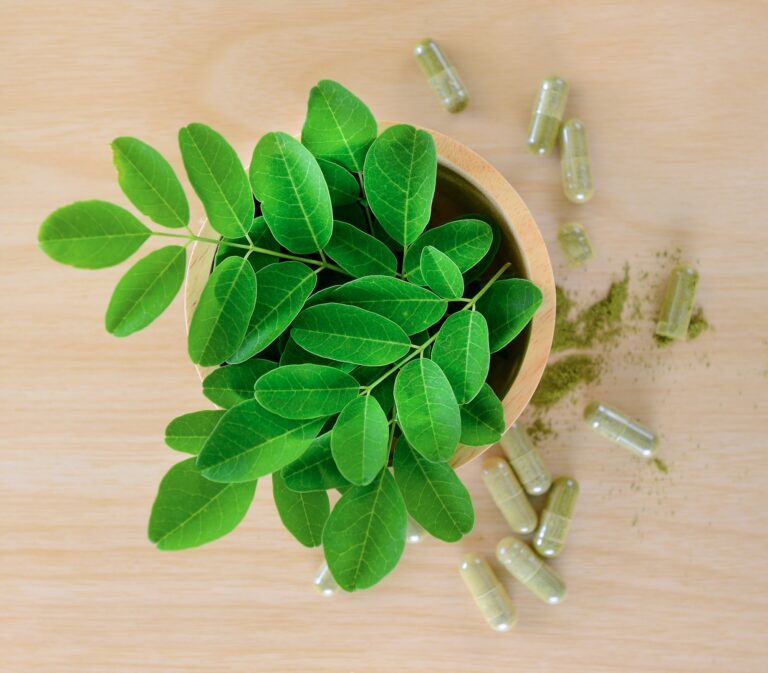
5 Menopause Support Complex Supplement to Help Ease Symptoms
Menopause support complexes are dietary supplements with herbal extracts and vitamins aimed at alleviating symptoms during menopause
Moringa Oleifera is an ancient natural remedy believed to offer numerous health benefits. It’s been used for centuries in traditional Chinese and Ayurvedic medicine. Nowadays, many people are turning to moringa supplements for their claimed benefits. But how does it work and what does it offer? Here, we uncover the benefits of moringa supplementation, from its powerful antioxidant properties to its purported effects on inflammation, blood sugar, anxiety, high blood pressure, bone health, and more. In short, we investigate the complexities of this medicinal plant in an effort to better understand the potential benefits of supplementing with moringa. Let the search begin.
Moringa supplements are widely popular for their powerful antioxidants, minerals, and vitamins. The moringa powder form is said to aid several health conditions ranging from lowering blood sugar levels and stabilizing blood pressure to preventing coronary artery disease, hypertension, obesity, and other chronic diseases.

Moringa is a plant, also known as the drumstick tree, which is native to tropical regions in Asia and Africa. It has been extensively used for centuries in traditional cultures due to its many health benefits. This plant is now gaining attention around the world thanks to its wide array of purported health benefits, with some claiming that it could even cure major diseases.
Moringa leaves are rich in proteins, vitamins, minerals, and other trace elements that make them an important part of a balanced diet, according to proponents of the tree’s medicinal properties. Supporters point out that consuming moringa leaf powder regularly can help balance hormones, boost immune system function, and reduce inflammation. Additionally, there is some research indicating that moringa may be beneficial for treating diseases like diabetes and high blood sugar levels, reducing blood pressure, and preventing certain types of cancer cells from forming.
On the other hand, some scientists prefer to caution against exaggerated health claims made by people who take moringa products. They argue that while consuming a portion of this plant on a regular basis may offer some health benefits, consuming large amounts of moringa will likely not result in extreme miracle cures. Therefore, more research needs to be done before making definitive claims about moringa’s ability to treat major illnesses like cancer or type 2 diabetes caused by abnormal blood glucose levels.
Let’s take a step back and discover why this plant is so highly valued across cultures around the world:
The Moringa Tree is a plant native to South Asia that has been used medicinally for centuries. It is quite versatile and harvested for its pods, leaves, flowers, bark, roots, and seeds. Moringa is one of the highly prized plants for its nutritional value as moringa contains a wide array of vitamins and minerals. In particular, the leaves contain large amounts of beta-carotene, calcium, and Vitamin C.
Despite these health benefits of consuming the whole plant, research on moringa shows that the leaves may have greater potential than other parts. Supporters argue that the dried leaves are easy to consume in powder form and make it simple to add to any meal or smoothie. Additionally, compared to other parts of the plant – like the root or bark – the leaves are much less bitter in taste. On the other hand, studies have shown that moringa contains unique compounds like terpenoids which have antioxidant effects, and fewer overall amounts of harmful toxins like cadmium or lead when compared with the leaves. As such, they suggest moringa may help diversify one’s diet by incorporating more than just the leaf into their daily intake.
Though there is no clear consensus regarding which part provides the greatest benefit to health overall, research suggests multiple parts contain beneficial components necessary for optimal well-being. With this knowledge in hand, it is becoming ever more apparent why many people around the world are turning to supplementation as an alternative treatment option for numerous physical ailments ranging from gastrointestinal disorders to metabolic diseases. Now that we know about some of its key characteristics, let’s dive deeper into how supplementation specifically can enhance our lives in different ways.

One of the main purported benefits of its supplementation is increased mental clarity and energy levels due to increased concentrations of minerals, free radicals, amino acids, and phytonutrients found in the leaves. The minerals present also support the healthy functioning of the immunity system, bones, and digestive systems, promoting overall well-being. Additionally, some studies showed that taking Moringa Oleifera powder every day for three days may have anti-inflammatory properties which may be beneficial for autoimmune diseases such as rheumatoid arthritis. While there is limited evidence to support these claims, the emerging research suggests that Moringa Oleifera supplementation may have numerous benefits when taken in moderation by most individuals.
Given the small but growing amount of evidence supporting its use as a dietary supplement, it appears there could be numerous benefits associated with Moringa Oleifera supplementation. With further research into its safety and effectiveness still underway, many believe that its potential could be a great asset in promoting stronger physical and mental clarity amongst diverse users – though, like any dietary supplement, it should be taken responsibly in accordance with professional advice.
The benefits of moringa supplementation don’t stop at its wide-ranging nutrient content. It also has the potential to dramatically improve the body’s immune system. High levels of vitamin C, Iron, selenium, and zinc in moringa supplements all contribute to a healthier immune system response. For example, vitamin C is essential for the production of collagen which is needed for a healthy immune system. Additionally, zinc is essential for activating certain enzymes that aid in immune responses as well as for wound healing.
The debate lies as to whether or not these additional compounds have any effect on overall immunity for those who are already utilizing a variety of vitamins and minerals – be it via diet or supplementation. Supporters of moringa supplementation argue that it can provide considerably greater protection from infectious agents due to the direct and indirect immuno-stimulatory compounds in moringa offered by phytochemicals such as polyphenols, flavonoids, and terpenes in moringa.
Overall, while there may still be some debate as to how great of an impact moringa supplementation has on the body’s immunity, many researchers widely agree that there is indeed a positive benefit to consuming this valued herbal supplement. From its wide-reaching nutrient content to potentially boosting immunity, further studies are still necessary to fully explore how moringa can enhance our health inside and out. As we continue with this exploration of moringa supplementation, let us now dive into its effects on skin health and appearance.
Among the many naturally occurring compounds found in moringa, vitamins A and C have been known to be powerful skin protectants. It is believed these vitamins, along with other antioxidants, can help improve the appearance of your skin, its elasticity and prevent aging. These effects are further evidenced when considering the high levels of fatty acids contained within moringa, which could help supply the body with extra hydration and smoothness of the skin.
As some debate this point, proponents argue that adding moringa supplements to one’s diet can cause clear and positive impacts on skin health. Evidence has indicated that moringa is rich in vitamin A and vitamin E, two natural antioxidants which may contribute to minimizing wrinkles by repairing damaged skin cells while providing deep hydration. This long-term hydration often results in a brighter complexion over time. Ultimately, further animal studies are required to better understand how moringa impacts skin health; however preliminary evidence suggests a promising benefit for those looking for an all-natural beauty remedy.
With an increasing emphasis on nutrition and diet, as it relates to overall health, it is valuable to explore what role moringa could play in an individual’s daily life outside of its impact on the immune system. By understanding how moringa supplementation can support both a healthy lifestyle and the body’s ability to instinctively heal itself, you can begin learning about what potential new health benefits might exist for including this substance in your diet.
Studies have shown people who use moringa leaf powder every day experience the effects of the powerful concentration of vital nutrients, such as vitamins A, B, and C, as well as essential minerals such as calcium, potassium, and magnesium. Moringa also contains micronutrients such as iron, zinc, and copper, making it essentially a superfood.
It is therefore not surprising that incorporating moringa into one’s diet can serve to effectively enhance nutrition intake when dietary restrictions or imbalances exist. Furthermore, for individuals who do not have easy access to fresh fruits and vegetables, supplementation with moringa provides a convenient way to ensure an adequate nutrient intake. As such, it could be argued that supplementation with moringa could potentially have a positive effect on health through enhanced nutrition as long as deficiencies already exist or the benefits outweigh any potential risks.
However, we must emphasize that supplementation with moringa should never replace physical activity or balanced nutrition from whole foods; instead, it should only be used in addition to these other methods. While there may be certain groups that could benefit significantly from moringa supplementation—such as those with disabilities that limit their ability to eat an adequate variety of healthy foods—it is important to remember that every person’s body is unique and requires an individualized approach. Ultimately it is up to each individual to weigh the benefits against the risks before embarking on supplementing with moringa.
Now that we’ve discussed how moringa can enhance nutrition intake, let’s take a look at the various types of supplements available to help you make informed decisions about which type might be best for your individual situation.

Moringa supplementation comes in a variety of forms that can provide an array of health benefits. Depending on the individual needs, each person can decide which type of supplementation is best for them. Moringa is often sold as dietary supplements in powder or capsule form, as well as a liquid extract.
Buying moringa capsules is the most common form of supplement, as they allow convenience and ease of use. Most capsule supplements are easy to swallow since moringa does not require any additional preparation other than being taken with water. They are also great for travel because they don’t require refrigeration or large measurements like powders do. However, capsules can be more expensive when taken in larger dosages.
The powder is another popular type of moringa supplement. The powder has a mild and unpleasant taste for some people, so it should be taken with other food or liquid like juice or honey to avoid getting the full flavor. It takes longer to take effect because it must dissolve into the bloodstream slower than capsule supplements. Additionally, powders may cause gastrointestinal distress if not taken correctly. The supplement is often measured in teaspoons of moringa leaf powder, although they come in bulk amounts. The dried leaves are rich in vitamins and can come cheaper than capsule supplements depending on the quantity purchased.
Liquid extracts are perhaps the quickest form of moringa supplementation due to their faster absorption rate into the bloodstream since they do not need digestion like capsules or powders do. Liquid extracts often come with a dropper allowing individuals to finely adjust their dosage size. Some people find this option more palatable than powders because they can easily add it to their drinks and smoothies without altering their taste too much. However, these forms also tend to be slightly more expensive than capsules or powder supplements due to higher production costs associated with making and packaging liquids over solids.
When deciding what type of moringa supplement one should take, it really depends on individual preference and budgeting concerns. All three types have been proven effective in providing nutritional benefits when taken appropriately and safely, but some individuals may respond better to certain forms over others due to their personal biology and metabolism rates. Either way, adding any form of moringa supplementation into one’s daily routine can quickly lead to improved health given its impressive nutritional profile.

Menopause support complexes are dietary supplements with herbal extracts and vitamins aimed at alleviating symptoms during menopause

Vitamin C, D3, Zinc, and Quercetin support immune health. They enhance immune cell function, fight infections, reduce inflammation, and provide antioxidant benefits.

Ginseng, a valued herb with adaptogenic and antioxidant properties, is popular as a supplement for improved well-being, energy, and immune function.

Nootropic supplements enhance focus, memory, and cognitive function. They boost mental clarity, motivation, and creativity for improved performance and brain health.

Garcinia cambogia, a tropical fruit, is touted for weight loss. Its active ingredient, HCA, may inhibit fat formation, but evidence is limited. Consult a professional before use.

More and more people are jumping on the mushroom supplement bandwagon these days, but you should be aware that there are potential side effects you should know about before taking the plunge. Whether you’re begging for overall well being or looking for an extra performance boost, you’re going to want to make sure you’re making an informed decision before adding mushroom supplements to your daily routine. We’ve put together a list of potential side effects to look out for, so read on and learn the truth before you start popping those pills.

Moringa, the “miracle tree,” offers numerous benefits. Moringa supplements provide essential nutrients, antioxidants, anti-inflammatory effects, and potential blood sugar and cholesterol regulation. They support immunity and combat malnutrition, but medical advice is essential.

It’s a good thing that Mother Nature both created and found cures for many of the ailments we humans suffer from. From the common cold to serious diseases, herbs have the potential to not only alleviate symptoms, but to completely prevent illnesses in the first place! Herbal remedies for immune system support have become increasingly popular as natural ways to boost your immunity against illness start to catch on.
